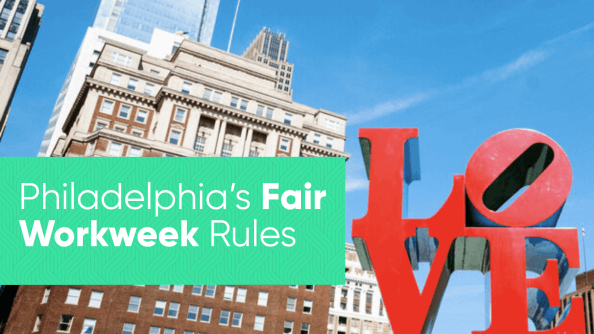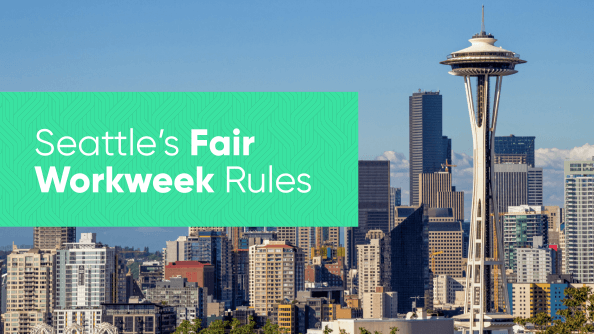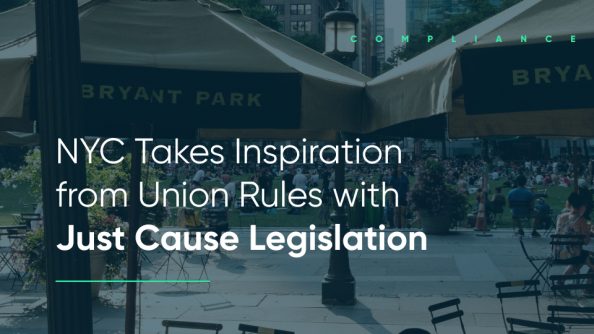Complying with NYC Fair Workweek Laws 2024

- By Harri Insider Team | September 17, 2024
Please note this advisory is intended for summary purposes only. Any guidance or materials provided do not constitute legal advice and cannot be substituted for the advice of legal counsel.
Stay in Compliance with New York Predictive Scheduling Laws in 2024 and Beyond
Fair Workweek Ordinances are sweeping across our major cities, and New York City is no exception. Also known as predictive scheduling laws, Fair Workweek Ordinances were created with the intention to create a stable, predictable work environment for service-based employees.
NYC’s Fair Workweek Law applies to all fast-food workers and fast-casual chains with more than 30 locations nationwide, including franchisees. Since its implementation in 2017, the NYC Fair Workweek Law has significantly strengthened protections for fast-food workers, offering them greater predictability in scheduling and access to additional hours before new employees are hired.
Over the years, the law has evolved to introduce stricter penalties for non-compliance, increase transparency in scheduling, and incorporate protections against unjust terminations. For employers, particularly those operating across multiple regions with varying regulations, this has created operational challenges and a need for rigorous compliance strategies. While welcomed by advocates for worker rights, the law’s expansions – such as the requirement for just cause termination in 2021 – have added new layers of complexity for fast-food chains and franchises. Today, businesses must ensure fair scheduling and maintain thorough documentation to avoid steep penalties for violations.
Some businesses have even established dedicated compliance teams to manage potential fines, though this can be costly and may not address the root issue—inefficient scheduling practices.
As the NYC Fair Workweek Law has expanded, so has the scope of enforcement, making compliance more critical than ever for fast-food chains and restauranteurs. The rules remain complex, with severe penalties for violations, and recent years have seen high-profile cases that underscore the law’s impact. For example, Chipotle has faced significant legal actions, including a $20 million settlement in 2022 for violating Fair Workweek and Paid Sick Leave laws, impacting over 13,000 workers.
In September 2024, New York City Comptroller Bran Lander launched the Employer Violations Dashboard, a comprehensive tool highlighting companies across various industries – such as Chipotle, Uber, and Gucci – for serious labor law violations. This dashboard, the first of its kind, consolidates data from city, state, and federal agencies to make public the worst offenders of workplace safety, wage theft, and other illegal labor practices. With this new tool, fast-food employers who violate Fair Workweek regulations are now part of a broader accountability system, including hefty fines, civil penalties, and public scrutiny via the “Employer Wall of Shame.”
Just Cause employment protection
Fair Workweek also includes a set of employment protection laws called Just Cause. Just Cause removes “at-will” employment for hourly workers that have worked 30 or more days in an organization. Employers can only take specific actions, such as reducing an employee’s schedule by more than 15% or terminating an employee, after following clear disciplinary procedures.
In this post, we’ll examine the specifics of the New York City Fair Workweek Ordinance and Just Cause laws in NYC, and how Harri’s scheduling tools can help protect your business from costly violations.
NYC Fair Workweek Regulations and Penalties: Predictive Scheduling Laws
Regular Schedules
The lawmakers understand that hospitality is a fast-paced industry with numerous moving parts making it difficult to predict staffing needs. However, it is also important to protect employees against last-minute scheduling changes. The concept of a Regular Schedule ensures that employees are provided an estimate of their weekly Work Schedule.
The NYC Fair Workweek Law requires that Regular Schedules:
- Outline the number of hours a fast-food employee can expect to work per week.
- Contain full details on the days, times, and locations an employee is expected to work.
- Be distributed to employees in writing or digitally.
If an employee’s Regular Schedule changes, the employer must provide an updated copy of the regular schedule to the affected employee as soon as possible, and before the employee receives the next work schedule.
Right To Rest Periods
“Clopening” shifts – where an employee is scheduled to work closing and opening shifts back-to-back – are a well-known issue in the industry. These shifts don’t often leave employees enough time to get home and rest before their next shift. NYC’s Fair Workweek ordinance addresses this by requiring a minimum of 11 hours between shifts. If the time between shifts is less than 11 hours, employees must provide written consent and be paid a $100 premium.
Advanced Notice on Scheduling
Schedules play a key role in managing employees’ day-to-day lives, affecting commutes, child care and other personal plans. The advance notice rules aim to protect employees from last-minute changes to schedules.
NYC law requires employers to provide 14 days advance notice for schedules. Any changes to the schedule after this period must be communicated within 24 hours. Employers must obtain employee consent before adding hours to their schedule if changes are made after the 14-day advance notice period. Additionally, employers must pay a schedule change premium for any adjustments made with less than 14 days’ notice.
Scheduling Penalties: Changes to the Date or Time of a Work Shift
No change in the number of hours:
- Less than 14 days’ notice: $10 per change
- Less than 7 days’ notice: $15 per change
- Less than 24 hours’ notice: $15 per change
Adding hours to the schedule:
- Less than 14 days’ notice: $10 per change
- Less than 7 days’ notice: $15 per change
- Less than 24 hours’ notice: $15 per change
Subtracting hours to the schedule:
- Less than 14 days’ notice: $20 per change
- Less than 7 days’ notice: $45 per change
- Less than 24 hours’ notice: $75 per change
Access To Hours For Existing Employees
The Access to Hours rule ensures that current employees have the first opportunity to accept new shifts before the employer hires new staff. Employers must offer these shifts to current employees for three days before seeking out new hires.
Just Cause and Progressive Discipline
Under NYC’s Just Cause law, employers must follow a progressive discipline system before reducing an employee’s hours, suspending them, or terminating their employment. This system ensures that employees are aware of company policies, receive consistent and fair discipline, and have an opportunity to improve their performance before termination.
Employers must have “just cause” to do the following:
- Reduce an employee’s weekly scheduled hours by 15%
- Suspend an employee
What qualifies as Just Cause, and when is it applicable?
All of the following criteria must be fulfilled for an employee to be eligible to receive significant schedule cuts or suspension:
- The employee was aware of the employer’s policies and rules that may result in discipline or discharge.
- Said policies and rules contain progressive discipline that was applied consistently and within reason.
- The employee violated said rule or practice.
- The employee was provided with relevant, quality training.
- The employer conducted a fair and objective investigation of the employee’s job performance
Just Cause applies to any employee who passes a 30-day probationary period. Employees who have worked fewer than 30 days remain subject to at-will employment, meaning they can be terminated without following Just Cause procedures.
Employers that discharge employees under these Just Cause rules must provide a written explanation for the employee’s termination. This written notice may be used as the employer’s supporting documentation if the discharge is challenged by the employee.
NYC Fair Workweek premium payment exceptions
Fair Workweek premium payments are not required when:
- The employee requests a schedule change to a specific shift in writing.
- An employee trades shifts with another employee.
- The employer is forced to close the restaurant due to circumstances outside their control.
Circumstances outside of an employer’s control may include threats to workers’ safety or the employer’s property, public utility failure, a shutdown of public transportation, fire, flood, or other natural disasters, or a government-declared state of emergency.
Protection Against Retaliation
Employees are fully protected under the NYC Fair Workweek law, meaning employers are not allowed to punish or retaliate against employees for exercising their rights under the law. The law also ensures confidentiality, meaning employers and managers may not disclose when a worker exercises their rights.
Retaliation includes:
- Disciplining, discharging, demoting, suspending, or reducing the work hours of the employee.
- Harassing, intimidating, discriminating against, or threatening employees.
Employers are not permitted to coerce employees into providing consent to schedule changes that are not compliant under NYC Fair Workweek.
Fair Workweek Compliance with Harri
Harri’s smart scheduling tools help managers handle the complex NYC Fair Workweek requirements and help create compliant schedules. The system predicts labor needs to improve efficiency and outlines potential schedule change premium payments, offering a complete operation and financial picture.
Here are some of the key features of Harri’s system:
Easy-to-use Regular Schedules
Harri’s scheduling tools make it easy to create a Regular Schedule during employee onboarding. The process of drafting, reviewing, and distributing the schedule is fully integrated, saving time by eliminating manual paperwork tasks.
Direct Shift Swaps
Shift swaps are a significant component of New York’s Fair Workweek rules. If employees arrange their own shift swaps, employers are not required to pay schedule change premiums.
Harri Available Shifts Pool
Harri’s Available Shifts Pool functionality allows employees to exchange shifts directly with each other.
Here’s how the Available Shifts Pool works:
- Employees use the app to release a shift if they are unavailable to work.
- Other employees, who have indicated availability, receive a notification that a shift is available.
- They can request to pick up the available shift and managers can manually approve the shift pick-up, or enable auto-approval.
Calculation of Right to Rest Compensation Payment
Harri helps managers comply with NYC Right to Rest rules by providing real-time calculations of potential payments for clopening shifts. The system also alerts managers when a schedule violates the required rest period between shifts, allowing changes before the schedule is posted.
Manager Alerts for Scheduling Penalties
Any schedule changes made after the NYC Fair Workweek advance notice period will trigger warnings at the point of scheduling. Harri shows the schedule change premium amount on the schedule, and this amount is included in total wage cost calculations for full labor cost transparency.
Comprehensive Fair Workweek Cost Reports
Harri’s reporting features allow managers to make informed strategic decisions regarding scheduling policies across individual locations or entire businesses.
Create real-time reports that outline:
- Labor costs
- Costs of scheduling changes
- Premium payments
- Other Fair Workweek violations
NYC Fair Workweek premium payments and violations may quickly add up, especially for businesses with large teams and multiple locations. It’s not unusual to see these costs rise into the thousands.
Harri includes several Just Cause-specific tools and alerts to ensure hospitality operators avoid accidentally violating complex employment protection laws.
One important feature is the ability to restrict employee terminations to specific managers or HR personnel who are familiar with Just Cause’s legal requirements. This ensures that terminations are handled properly, avoiding costly violations.
Want to learn more about how Harri can support you with your compliance? You can see our compliance hub here, or book some time to speak to an expert.
NYC Fair Workweek FAQ
What is the NYC Fair Workweek Law and who does it apply to?
The NYC Fair Workweek Law, aims to establish a stable and predictable work environment for service-based employees. It applies primarily to fast-food and fast-casual chain workers in establishments with over 30 locations nationwide, including franchisees.
What are Regular Schedules and what details must they include for NYC Fair Workweek compliance?
Regular Schedules are a requirement under the NYC Fair Workweek law, and they are intended to give employees an estimate of what hours they will be scheduled on a weekly basis. These estimates must outline the expected weekly work hours, detail days, times, and locations of work, and be provided in writing or digitally. If an employee’s regular schedule changes for any reason, the employer must give a written updated copy of the regular schedule to the affected employee as soon as possible and before the employee receives the first work schedule following the change.
How does the Right to Rest rule affect scheduling of shifts in New York?
The Right to Rest rule in New York addresses the issue of “clopening” shifts, where employees work closing and opening shifts back-to-back with insufficient rest. The law prohibits scheduling these shifts with less than 11 hours between them, unless the employee consents in writing and is paid a $100 premium.
What are the penalties for failing to comply with the NYC Fair Workweek laws?
Non-compliance with NYC Fair Workweek laws can lead to heavy fines. Penalties vary depending on the nature of the violation, such as failing to provide Regular Schedules, violating the Right to Rest rule, or not giving advanced notice for schedule changes.
What is required for an employer to legally reduce an employee’s schedule or terminate them under the Just Cause law?
Under the Just Cause law, employers in NYC can reduce an employee’s schedule or terminate them only after following specific disciplinary procedures. This includes ensuring the employee is aware of policies that may lead to such actions, applying progressive discipline consistently, and conducting a fair investigation into the employee’s performance.
Are there any exceptions to the Fair Workweek premium payment requirements?
Fair Workweek premium payments are not required when an employee requests a schedule change, when shifts are traded between employees, or if the employer must close the restaurant due to circumstances outside their control, such as natural disasters or public emergencies. Additional information on schedule change premium exceptions may be found here.
How does the NYC Fair Workweek law protect employees against retaliation from employers?
The NYC Fair Workweek law protects employees from retaliation for exercising their rights under the law. This means employers cannot punish, intimidate, or discriminate against employees who make use of their Fair Workweek rights, and must not coerce them into accepting non-compliant schedule changes.
What tools and features does Harri offer to help employers comply with NYC Fair Workweek laws?
Harri offers a range of tools to aid employers in complying with NYC Fair Workweek laws, including easy creation of Regular Schedules , direct shift swap functionalities, calculation tools for Right to Rest compensation, alerts for schedule change premium penalties, and comprehensive reports to manage Fair Workweek compliance more effectively.
What are the specific requirements for schedule changes under the advanced notice rules of NYC Fair Workweek?
According to the advanced notice rules of the NYC Fair Workweek law, employers must give employees their schedules at least 14 days in advance of the first day of the work schedule. Any changes within this period must be communicated within 24 hours, and employers must pay compensation for changes made after the notice period.
How do the Access to Hours rules affect the hiring process for new employees in NYC?
The Access to Hours rules under NYC Fair Workweek require employers to offer new shift opportunities to existing employees before hiring new staff.





















